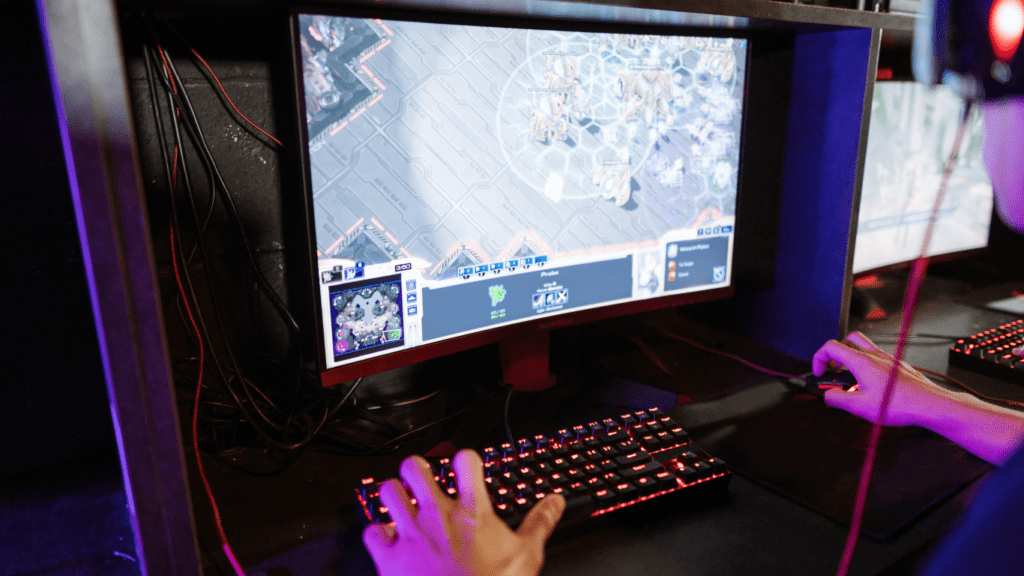Overview of the Gaming Platforms
Gaming platforms vary in terms of cost, hardware, and user experiences. This section breaks down the economic aspects of gaming consoles and PC gaming.
Cost Analysis of Gaming Consoles
Initial purchase: Gaming consoles, like PlayStation 5 and Xbox Series X, usually cost between $400 and $500. These prices include necessary components such as:
- The console
- Controller
- Basic cabling
- Accessories: Optional accessories like extra controllers or VR sets add to the cost. Controllers cost about $60 each, while VR sets can be priced between $300 and $400.
- Games: New games generally cost $60 each. Subscription services like Xbox Game Pass offer access to multiple games for $10 to $15 monthly.
- Maintenance: Costs for repairs and maintenance are generally low. Extended warranties cost around $50 to $70.
Cost Analysis of PC Gaming

Initial setup: A mid-range gaming PC starts around $800 to $1,200. High-end rigs can exceed $2,000, with custom builds potentially surpassing $3,000.
Components: Essential components include the GPU, CPU, RAM, and storage.
For example, a decent GPU like the NVIDIA RTX 3060 can cost around $330. High-end GPUs like the RTX 4090 can exceed $1,500.
Accessories: Monitors, keyboards, and mice add to the cost. A good gaming monitor starts at $200, while mechanical keyboards and gaming mice cost $50 to $150.
Games: PC games’ prices range similarly to console games. Platforms like Steam offer frequent sales and bundles, potentially lowering overall costs.
Upgrades: The ability to upgrade individual components, while advantageous, also adds to long-term costs. Upgrading a GPU or adding RAM might cost a few hundred dollars.
Maintenance: Regular maintenance includes software updates, hardware cleaning, and potential part replacements. Extended warranties for individual components range from $20 to $100.
Both platforms have their unique cost structures, influenced by initial investments, ongoing expenses, and user preferences.
Initial Purchase Price and Setup
Comparing the initial price and setup for gaming consoles and PCs is crucial for understanding their economics.
Gaming Console Expenses
Gaming consoles typically offer a straightforward setup with a single device purchase. Popular models like the PlayStation 5 and Xbox Series X usually cost between $500 and $600.
These prices often include one controller but not additional accessories. Extra controllers, headsets, and charging stations can add $100 to $150.
Games usually cost around $60 each, with subscription services like Xbox Game Pass adding approximately $10 to $15 per month.
PC Gaming Expenses
PC gaming involves a more complex initial setup with several components. A good gaming PC can range from $800 to several thousand dollars, depending on the specifications.
Key components include the GPU, which can cost $200 to $1,500, and the CPU, typically priced between $150 and $600. Additional necessary parts like RAM, storage, and a power supply may add another $300 to $800.
Monitors and peripherals like keyboards and mice usually start at $50 each but can reach several hundred dollars for high-end models. Pre-built gaming PCs often simplify this process but can be more expensive.
Expense Category
| Gaming Consoles |
PC Gaming
|—————–|
1. Initial Device
| $500 – $600 |
$800 – $3,000+
2. Additional Accessories
| $100 – $150 |
$100 – $800
3. Games
| $60 each |
$30 – $60 each
4. Subscription Services
| $10 – $15/month |
$5 – $15/month
Gaming console setup requires minimal effort, simply plug in and play. PC gaming setup varies in complexity, involving component assembly or pre-built options.
By comparing these initial purchase prices and setup requirements, I can better understand the financial commitment needed for gaming consoles versus PC gaming.
Long-Term Costs and Upgrades
When comparing gaming consoles and PC gaming, long-term costs and upgrades play a crucial role. Each platform offers unique considerations for upgrading hardware and software over time.
Upgrading Gaming Consoles
Gaming consoles typically require fewer upgrades. Manufacturers release new console generations every 6-7 years. Within this cycle, minor updates for system software are free.
Newer consoles often provide backward compatibility, so users aren’t forced to buy new games for each generation.
Controllers and other accessories might need replacement every few years, costing around $50-$70 per item.
The fixed nature of consoles simplifies the upgrade process, although it limits the extent to which users can enhance performance.
Upgrading PCs
PC gaming offers extensive upgradability. Users can replace or add components such as GPUs, CPUs, RAM, and storage. Graphic card upgrades, for instance, can drastically enhance performance and visual quality.
However, costs vary widely: high-end GPUs range from $500-$1,500, CPUs from $250-$700, and RAM upgrades from $100-$300.
Additionally, users may invest in cooling solutions, power supplies, and peripherals. Over time, these incremental upgrades can spread costs but necessitate technical knowledge.
This customization allows for a tailored gaming experience and extends the lifespan of the gaming rig.
Game Availability and Subscription Models
Game availability in consoles and PC gaming significantly influences the overall gaming experience and can affect economic decisions.
Subscription models further complicate the landscape, offering various benefits and costs.
Exclusive Titles and Their Impact
Exclusive titles can make or break a decision between gaming consoles and PC. Consoles often secure exclusives to attract specific demographics.
For instance, the PlayStation 5 boasts titles like “God of War” and “The Last of Us” that aren’t available on other platforms. On the Xbox Series X side, games like “Halo Infinite” and “Forza Horizon” serve as significant draws.
For PC gaming, exclusives are less common but exist. Games like “Age of Empires” and “StarCraft” help maintain its unique appeal.
The abundance of indie games and mod support further diversifies the PC gaming catalog. However, the lack of widely celebrated AAA exclusives can be a downside for some players.
Subscription Services and Their Costs
Subscription services offer additional value and access to a wider variety of games. For consoles, Xbox Game Pass and PlayStation Plus are notable.
Xbox Game Pass costs $10 per month for console or PC and $15 per month for the Ultimate plan that includes both platforms plus additional perks.
This service offers a rotating library of over 100 games.
PlayStation Plus varies in cost, with Essential at $60 per year, Extra at $100 per year, and Premium at $120 per year.
Each tier provides different benefits, ranging from online multiplayer access to a catalog of downloadable games. Both services aim to keep players engaged with diverse offerings and regular updates.
PC gaming also features subscription models, with services like EA Play and Ubisoft+. EA Play costs $5 per month or $30 per year, providing access to EA’s past releases and early trials of new games.
Ubisoft+ follows a similar model at $15 per month, offering a vast library of Ubisoft titles.
Game availability and subscription models significantly impact gaming economics.
While exclusive titles sway initial purchasing decisions, subscription services provide ongoing value and access to large game libraries, ultimately affecting long-term costs and enjoyment.


 is a key contributor to Luck Lounge Land, bringing her expertise in psychology and behavioral analysis to the platform. Her work focuses on the psychological aspects of gambling, helping users understand player motivations and decision-making processes. Morgana’s well-researched articles make her a respected voice in the community.
She also contributes to the site's 'Game Theory Academy,' developing modules on strategic thinking. Outside of her professional work, Morgana enjoys studying the latest trends in casino games and behavioral research. Her passion for the field and engaging writing make her a valuable asset to the Luck Lounge Land team.
is a key contributor to Luck Lounge Land, bringing her expertise in psychology and behavioral analysis to the platform. Her work focuses on the psychological aspects of gambling, helping users understand player motivations and decision-making processes. Morgana’s well-researched articles make her a respected voice in the community.
She also contributes to the site's 'Game Theory Academy,' developing modules on strategic thinking. Outside of her professional work, Morgana enjoys studying the latest trends in casino games and behavioral research. Her passion for the field and engaging writing make her a valuable asset to the Luck Lounge Land team.
